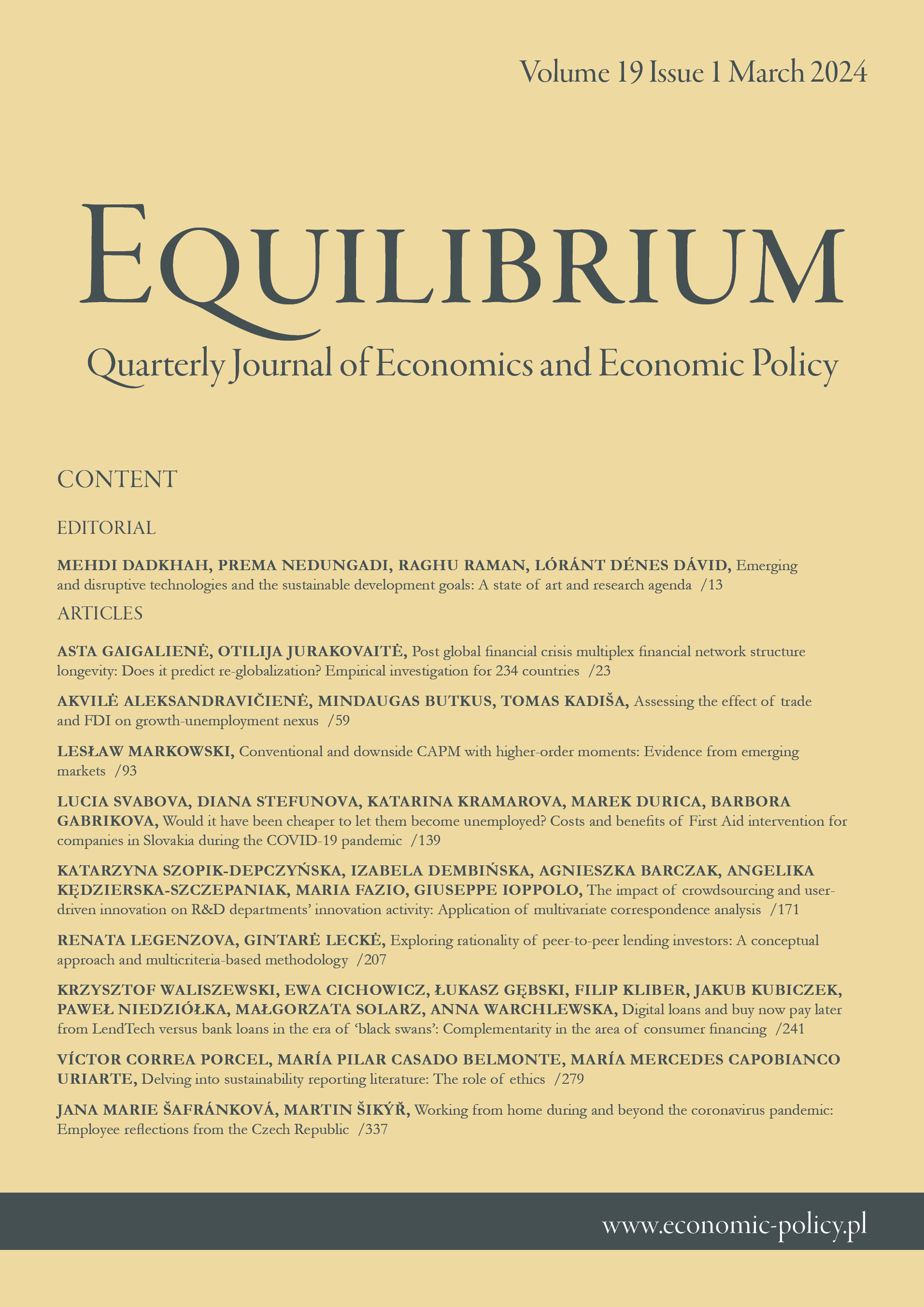金融交易税:对选定欧盟国家的方差分析评估
IF 6.2
Q1 ECONOMICS
Equilibrium-Quarterly Journal of Economics and Economic Policy
Pub Date : 2020-03-31
DOI:10.24136/eq.2020.002
引用次数: 10
摘要
研究背景:金融资产的财税形式多种多样。近年来,欧盟对金融交易税的讨论与寻找解决金融危机带来的问题有关。欧盟委员会为加强资本监管做出了一些努力,并通过了《关于在金融交易税领域加强合作的指令》,根据那些已经在国家立法中实施类似交易税的国家,分析了FTT的选择和影响。本文的目的:我们的目的是找出FTT与经济增长之间的经济关系,并分析FTT在选定的欧盟国家内的影响。方法:本文将分析欧盟地区的银行业环境,并强调税收政策与经济增长之间的相关性。我们将通过三元混合效应方差分析来测试FTT,并分析比利时、爱尔兰和英国三个成员国对其他欧盟国家实施FTT的态度非常积极。研究结果与增值:我们感兴趣的是:(1)测试金融交易税(FTT)与经济增长(GDP)之间的关系;以及(2)验证FTT可以提高一个国家GDP增长的假设。我们假设,如果一个国家在其税收制度中采用了自由贸易,那么它将导致GDP的显著增长,因此它可能导致危机后金融市场的改善。我们的研究结果表明,FTT数量的增加只会导致经济增长的微不足道的增长。本文章由计算机程序翻译,如有差异,请以英文原文为准。
The financial transaction tax: an ANOVA assessment of selected EU countries
Research background: There are various forms of fiscal taxation of the financial assets. In recent times, the discussion about financial transaction tax in the EU is associated with finding the solution to problems due to great financial crisis. The European Commission has made some efforts to strengthen capital regulation and it has adopted the Directive about implementing enhanced cooperation in the field of financial transaction tax, where it analyzed options and impacts of FTT according to those countries which have already implemented similar transaction taxes in their national legislatives. Purpose of the article: Our aim is to find out the economic relationship between FTT and economic growth and to analyze the effect of FTT within selected EU countries. Methods: In this paper, we will analyze the banking environment in the EU area, and we emphasize the correlation between tax policy and economic growth. We will test FTT through three-way mixed-effects ANOVA, and analyze three Member states, Belgium, Ireland and the United Kingdom, which have very active attitude to implementation of FTT within other EU countries. Findings & Value added: We are interested in: (1) testing the relationship between the financial transaction tax (FTT) and economic growth (GDP); and (2) to verify the hypothesis that FTT could improve GDP growth in a country. We assume that if a country has adopted FTT in its tax system, then it will lead to a significant GDP growth, and so it could lead to financial market improvement after the crisis. Our results have shown that an increase in FTT volume would lead only to a negligible increase in the economic growth.
求助全文
通过发布文献求助,成功后即可免费获取论文全文。
去求助
来源期刊
CiteScore
9.20
自引率
3.50%
发文量
28
审稿时长
36 weeks
期刊介绍:
Equilibrium. Quarterly Journal of Economics and Economic Policy is a scientific journal dedicated to economics, which is the result of close cooperation between the Instytut Badań Gospodarczych/Institute of Economic Research (Poland) and Polish Economic Society and leading European universities. The journal constitutes a platform for exchange of views of the scientific community, as well as reflects the current status and trends of world science and economy.
The journal especially welcome empirical articles making use of quantitative methods in: Macroeconomics and Monetary Economics, International Economics, Financial Economics and Banking, Public Economics, Business Economics, Labor and Demographic Economics, Economic Development, and Technological Change, and Growth.
Current most preferable topics and special issues:
The economics of artificial intelligence: business potentials and risks;
Digitalization and entrepreneurship in economics;
Sustainable socio-economic development, environmental and ecological economics;
Transition in the energy market (improving energy efficiency, alternative energy sources, renewable energy, energy security).

 求助内容:
求助内容: 应助结果提醒方式:
应助结果提醒方式:


